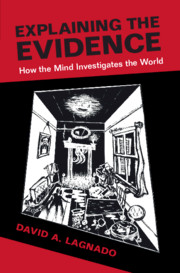Book contents
- Explaining the Evidence
- Explaining the Evidence
- Copyright page
- Dedication
- Contents
- Figures
- Tables
- Preface
- Acknowledgements
- Chapter 1 The Cliff Death
- Chapter 2 Models in Mind
- Chapter 3 Causal Modelling
- Chapter 4 Thinking beyond Biases
- Chapter 5 Expert Reasoning in Crime Investigation
- Chapter 6 Questions of Evidence
- Chapter 7 Competing Causes
- Chapter 8 Confirmation Bias
- Chapter 9 Telling Stories
- Chapter 10 Idioms for Legal Reasoning
- Chapter 11 Causal Reasoning in a Time of Crisis
- References
- Index
Chapter 5 - Expert Reasoning in Crime Investigation
Published online by Cambridge University Press: 20 October 2021
- Explaining the Evidence
- Explaining the Evidence
- Copyright page
- Dedication
- Contents
- Figures
- Tables
- Preface
- Acknowledgements
- Chapter 1 The Cliff Death
- Chapter 2 Models in Mind
- Chapter 3 Causal Modelling
- Chapter 4 Thinking beyond Biases
- Chapter 5 Expert Reasoning in Crime Investigation
- Chapter 6 Questions of Evidence
- Chapter 7 Competing Causes
- Chapter 8 Confirmation Bias
- Chapter 9 Telling Stories
- Chapter 10 Idioms for Legal Reasoning
- Chapter 11 Causal Reasoning in a Time of Crisis
- References
- Index
Summary
Chapter 5 examines expert reasoning, with a focus on detectives solving murder cases. I introduce the data-frame theory of sensemaking, which argues that experts and novices share the same modes of reasoning, both relying heavily on causal models and simulation, but with experts using richer models informed by their experience and training. We also see how detectives use specialist knowledge and organizing structures, including chronologies, crime typologies and legal scripts, all attuned to the investigative context. Finally, I argue that most research on crime investigation focuses on how investigators explain evidence, but it gives us few details about how investigators evaluate complex evidence.
Keywords
- Type
- Chapter
- Information
- Explaining the EvidenceHow the Mind Investigates the World, pp. 112 - 131Publisher: Cambridge University PressPrint publication year: 2021

